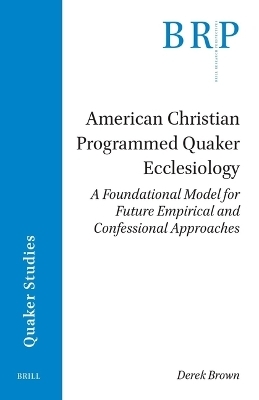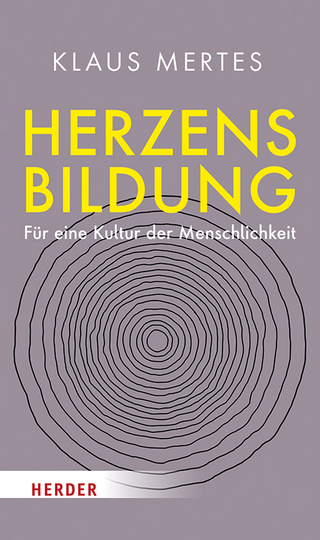
American Christian Programmed Quaker Ecclesiology
Brill (Verlag)
978-90-04-53589-3 (ISBN)
In American Christian Programmed Quaker Ecclesiology, Derek Brown argues that American Christian Programmed Quakerism has inherited a practical and pragmatic ecclesiology at the expense of an ontological understanding of the church. Inspired by the work of Gerben Heitink, Brown proposes a normative, deductive, ontological ecclesiology based on the biblical concept of koinonia, which would act as a 'foundational' model for future confessional, empirical, and practical efforts. To help form the proposed ecclesiology, Brown explores the ecclesiological views of George Fox and Robert Barclay, the adoption of the pastoral system, and the emergence of the Evangelical Friends Church. The ecclesiological writings of Miroslav Volf, Wolfhart Pannenberg, Hans Küng, Jennifer Buck, and C. Wess Daniels are also surveyed.
Derek Brown, Ph.D. (2017), Johnson University, is Vice President for Academic Services and Professor of Practical Theology at Barclay College. He has previously published an Evangelical Friends pastoral theology, On Quakers and Pastors (Barclay Press, 2019).
Abstract
Keywords
1. Introduction
1.1. Justification of Research
1.1.1. Pragmatic, Practical Ecclesial Identity
1.1.2. Adoption of the Pastoral System
1.1.3. Lack of a Deductive, Normative Ecclesiology
1.1.4. Evangelicalism not Conducive to Ecclesiology
1.2. Scope of Research
1.2.1. American
1.2.2. Christian
1.2.3. Programmed
1.2.4. Quaker
1.2.5. Local Church
1.3. Overview of this Book
2. Ecclesiology
2.1. Ecclesiology 'From Above' or 'From Below'
2.2. Ontological Ecclesiology
3. Images and Marks of the Church
3.1. Biblical Images of the Church
3.1.1. Ekklesia
3.1.2. People of God
3.1.3. Body of Christ
3.1.4. Temple of the Holy Spirit/God's Temple
3.2. Marks of the Church
3.3. Conclusion
4. Survey of Quaker Ecclesiological Thought
4.1. Early Quaker Ecclesiology
4.1.1. George Fox's Ecclesiological Imagery
4.1.2. Robert Barclay's Apology
4.2. Adoption of the Pastoral System
4.2.1. Richmond Declaration
4.3. Evangelical Friends
4.3.1. Ecclesiological Themes
4.3.2. Affirmation of the Friends 'Church'
4.3.3. Invisible/Visible Church
4.3.4. Church and the New Covenant
4.3.5. Body of Christ, Christ as Head
4.4. Contemporary Quaker Ecclesiological Research
4.4.1. Jennifer Buck's Reframing the House
4.4.2. C. Wess Daniels' A Convergent Remodel of Renewal
4.5. Conclusion
5. Comparative Analysis: Three Theologians
5.1. Hans Küng
5.1.1. Summary of Küng's Ontological Views
5.1.2. Küng's Contribution
5.2. Wolfhart Pannenberg
5.2.1. Summary of Pannenberg's Ontological Views
5.2.2. Pannenberg's Contributions
5.3. Miroslav Volf
5.3.1. Summary of Volf's Ontological Views
5.3.2. Volf's Contributions
5.4. Conclusion
6. Single-Image Ontological Model
6.1. 'Single-Image' Model
6.2. Ontological Model
6.3. Purpose of a Single-Image Ontological Ecclesiology
6.4. Gerben Heitink's Practical-Theological Ecclesiology
6.5. Conclusion
7. Koinonia as Single-Image Ecclesiological Model
7.1. Biblical Understandings of Koinonia
7.2. Koinonia, not 'Communion Ecclesiology'
7.3. Theological Implications of a Koinonia Ecclesiology
7.4. Conclusion
8. Support for a Koinonia Ecclesiology
8.1. Biblical, Christian Ecclesiology
8.2. Continuity of Liturgical Plene Esse
8.3. Connection with Historical Quakerism
8.4. Precedent in United Methodist Ecclesiological Research
8.5. Critical Attitude towards Bureaucracy
8.6. Theological Enrichment of 'Normal' Church Tasks
8.7. Ecclesiastical Repentance, Relocation, and Reengagement
8.8. Scalability
8.9. Conclusion
9. Implementation and Areas of Further Research
9.1. Connecting Ontology and Teleology
9.2. Koinonia Ecclesiology at Yearly Meeting Level
10. Conclusion
References
| Erscheinungsdatum | 27.01.2024 |
|---|---|
| Reihe/Serie | Brill Research Perspectives in Humanities and Social Sciences / Brill Research Perspectives in Quaker Studies |
| Verlagsort | Leiden |
| Sprache | englisch |
| Maße | 155 x 235 mm |
| Gewicht | 183 g |
| Themenwelt | Geisteswissenschaften ► Religion / Theologie ► Christentum |
| Sozialwissenschaften ► Soziologie ► Empirische Sozialforschung | |
| ISBN-10 | 90-04-53589-6 / 9004535896 |
| ISBN-13 | 978-90-04-53589-3 / 9789004535893 |
| Zustand | Neuware |
| Haben Sie eine Frage zum Produkt? |
aus dem Bereich


